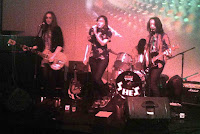Andy Summers, The Police
Oxford, 1978
It was an earlyish Police gig, in a smallish theatre, maybe about a thousand people. We were playing our set when suddenly the doors burst open and about 30 skinheads walk in, fully clad, in leather and bovver boots. And we were like: "Fuck." They walked down to the front and started pogoing and moshing and screaming "Sieg Heil!" – it was really fucking intense. No one knew where it was going to go. And I have to hand it to Sting, because he invited them all to come up on stage. So they were pogoing all over the place, and it was just ridiculous, us trying to keep playing throughout. Sting got them all singing along. Then he told them to fuck off. And eventually they did. A week later, our very tough London promoter went down to Oxford with a bunch of guys, found them, and divine retribution was delivered.
Peter Murphy, Bauhaus
Hammersmith Palais, May 1983
It was the last show Bauhaus played. The performance was quite intense and overwrought. We were at the height of our career and just about to break, and there was a decision to split, so I wasn't expecting the gig to be triumphant. I felt like I was jumping off the edge of a cliff into the sea. There was an audible gasp when the audience saw us come out – we knew how fervent they were. But between the band there was a lot of juvenile but dark, repressed, negative energy – sort of: "We are the creme de la creme and we can do what we like, we can split up or we can record a fart as a track on an album." I personally had to get out of that. But it was the end of something I had worked very hard to achieve, so it was very bitter. It was never going to be violent – it was gentlemanly, all stiff upper lip and respectful. One of the band members, though, chose to close the show with the words "RIP", and that was not cool: it was as though we were some death-orientated, Munster-rock band, and it cemented the perception of us as this graveyard rock thing, later to be identified as goth. I always thought of Bauhaus as the Velvets gone holy, or the Sweet with better haircuts.
Carl Palmer, Emerson, Lake & Palmer
Chicago, 1974
We were in a town called Normal. The concert was sold out and all was going well, until the encore. We all walked to the front of the stage to take a bow when a grand piano appeared behind us through a hole in the stage. Just as it opened, I stepped back and fell in the hole. Luckily, one of the road crew caught me, but I ended up breaking a rib and had to finish the gig with a large red and purple patch on my right side. I spent the rest of the night in the local hospital being woken up every hour in case I had internal bleeding. There was nothing "normal" about it.
Roger Hodgson, Supertramp
Reading Festival, 1974
It was pelting down with rain and we were all drenched but soldiered on. My amplifier blew up and I was forced to play with a small practice amp - a Fender amp that was not grounded and every time I went up to sing and touched the microphone, I got an electric shock. The amp was so quiet I couldn't hear it so I was playing blind, soaked to the skin and getting electric shocks every other minute. Gratefully, I'm still alive and touring and lived to tell the tale.
----------------------------------
Help support this blog. Any purchases made through our Amazon links help support this website with no cost to you.You should follow me on Twitter for daily news and updates on production and the music business.
Don't forget to check out my Music 3.0 blog for tips and tricks on navigating social media and the new music business.




